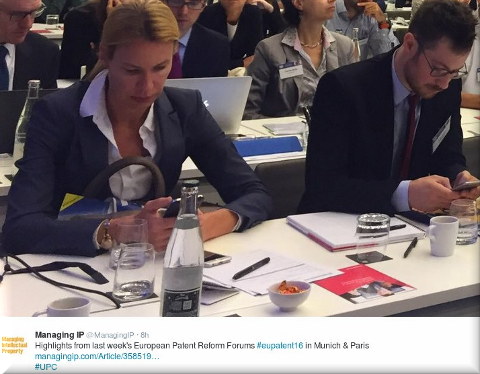
 Photo credit: Managing IP tweet, but modified (cropped) slightly
Photo credit: Managing IP tweet, but modified (cropped) slightly
"I refuse to propagate such blatant lies from Battistelli about reforms disclosed in a staged interview published by #managingip," one person from the EPO wrote today. Some people are demonstrably unhappy about Managing IP propagating the lies of Battistelli, as recently as last week (more to come later this month in part two).
Margot Fröhlinger of the EPO gave a historical account of previous failed attempts to create a unitary patent system in the EU before 25 member states agreed in 2011 to proceed through the enhanced cooperation procedure. In a nutshell, they failed because of disagreement over language and the associated court system. Fröhlinger said the Brexit result was hugely disappointing, but hopes history won’t repeat itself because the system is nearly ready and, in her view, "very important" to the Single Market. She said: "There is hope that the system will not come to a halt. It will go ahead. There is too much support and too much investment." To her mind, the question now is whether the system will go ahead with or without the UK. She said: "It’s now a political issue not a legal one because it is relatively easy to change an agreement which is not yet in force."
The two key UPC Agreement provisions which require amendment are Article 89, to remove the requirement for UK ratification, and Article 7(2), which deals with the UK’s Central Division seat. She went on to explain how this solution may be achieved. The first step is for the other member states to convene a diplomatic meeting on the margins of an EU Summit or the Competitiveness Council meeting to discuss possible amendments. This must include the UK. In terms of agreement by member states, "only a qualified majority is needed". But she expressed concerns over likely disagreements which will cause delay. "There is a risk that other member states will start throwing in their amendments." In terms of seat, she said France, the Netherlands, Germany and Italy are all likely to stake a claim. Getting all of the amendments approved quickly would depend on the constitutions of member states, but if all goes well we shouldn’t expect years of delay. "Most member states will be able to do a simplified ratification," she said, citing Denmark as an example where another referendum won’t be required. "So we could be looking at 6 to 9 months delay not 5 years."
The expectation was that the system will start operation next year. With the uncertainty over the UK government’s Brexit policy and plans, "how long can other member states wait for the UK to make a decision?" That was a question put to the panel. "Member states shouldn’t wait too long. Perhaps a matter of months," Fröhlinger responded. "If there is no sign of UK’s participation at the Competitiveness Council meeting this month or in November then member states should act quickly." She added: "Germany’s ratification should go ahead to avoid giving bad signal to other countries."
Fröhlinger envisages no major legal obstacle to the continued participation of the UK in the UPC after its exit, provided it accepts Chapter IV of the UPCA, and, moreover, other member states want the UK to be part of it. She takes comfort in the CJEU’s decision in challenge to the Unitary Patent Regulations. "The CJEU demonstrated extreme pragmatism," she said, but then went on to warn that the CJEU’s Opinion 1/09, which dealt with the UPCA’s predecessor, is open to interpretation. "There are no guarantees in life so no one is sure if the CJEU will agree on the legality of UK’s participation if challenged," she added. Fröhlinger also fears the risk of unravelling the compromises in the UPCA but questions if the CJEU will be "politically insensitive". She believes the CJEU will give "its blessing" to the system again when called up.